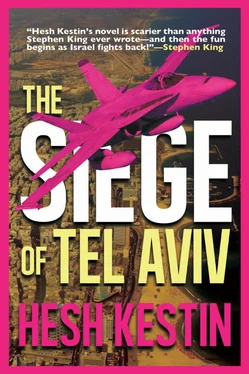“Massawi Red to Massawi Flight. Massawi Red to Massawi Flight. Follow my lead, brothers. First the ships, then anything moving on the beach. Massawi 2 the second ship, Massawi 3 the third, Massawi 4 the fourth, Massawi 5 the fifth, and Massawi 6 in reserve. The lead freighter is mine.”
Under his breath, he curses his superiors, who refused to give him more aircraft, suspecting a trap. Some trap. If he had more planes, he could simultaneously strafe the lines of people on the beach into a long stain of blood.
“Follow my lead, brothers. As the Americans say, it is shooting fish in an oil drum. In the name of Islam, let us expunge this plague of Jews and Christians. Death to the Crusaders! Over.”
ON CV STAR OF Bethlehem , Captain Frank is desperate, and shouting. “Do any of you people know how to fire one of these things? Are any of you veterans?” He has just managed to pull one of the Stinger missiles out of its box. “I need an infantryman here!”
He gets one, a red-haired diesel mechanic from Kansas City.
“Sir,” Taylor C. Briggs says. “You got that backwards. You’re gonna shoot yourself to kingdom come if’n you don’t turn it around.”
“You know how to operate one of these gizmos?”
“Piece of cake, sir. You see this here, this pops up. It’s your view-finder. Gives you general direction. Then you get it up on your shoulder—”
“Jesus H. Christ, kid. Don’t teach, do! Grab this pig iron and get ready. Those mothers are coming back. They’re turning now!”
A mile out to sea, the Syrian formation performs a graceful unified Immelmann turn and slows to come in low.
ASTAPLE OF AMERICAN infantry warfare since the 1980s, the FIM-92 Stinger missile is both one of the most complex weapons in the foot soldier’s armory and the simplest to operate. Once it is pointed in the general direction of enemy aircraft, its dozens of micro gyrocompasses home in on the heat from the target’s engines until it makes contact. The infantry calls it fire-and-forget. With a weight of only thirty-three pounds and an effective range of up to three miles, it is both lethal and, if one knows where to look, widely available on the open market in such places as Pakistan’s Hindu Kush, leftover stock supplied by US Special Forces to Muslim insurgents in neighboring Afghanistan. These mostly illiterate fighters used it to send the country’s Soviet invaders packing. They then turned the same weapon on the Americans who, in a triumph of wishful thinking, hoped they would not become targets of their own technology. Once taught, any child can shoot a Stinger, and did.
The red-haired kid on the deck of CV Star of Bethlehem was apparently paying attention during advanced infantry training at Fort Hood, Georgia. In a matter of moments, others on the deck pry open more crates. Firing Stingers is not only easy. It’s fun.
AS HE BRINGS HIS SU-24 out of its Immelmann, the Syrian wing commander sees the first missile rising to greet him. He dives. It misses his aircraft by inches, but homes in on his portside wingman, who abruptly ceases to exist. The resultant blast hits the Syrian wing commander’s own fuselage with an enormous push, so that his entire aircraft trembles momentarily before recovering. As the wing commander pulls out and heads to sea, he watches two more of his aircraft disappear in mammoth fireballs.
His radio lights up. “Massawi 5 to Massawi Red. Come in, Massawi Red. Commander, regarding the fish in the oil drum. The fish are shooting back! Over.”
“Roger that, Massawi 5. This is Massawi Red. All aircraft follow my lead. Back to base. Back to base. It is a Jewish trick! Over and out.”
OUT INDEED. AS THE remaining four Sukhois shoot eastward over the crippled city back to their base adjoining Yasser Arafat International Airport, a squad of female soldiers, following the lead of a plump nineteen-year-old red-headed sergeant who two months before had instructed recruits in Stinger operation, aim the weapons they have just removed of their crates. The remaining Sukhoi pilots, flying at Mach 1, break the sound barrier over the beach at 800 miles per hour. Flying at 1200 miles per hour, it takes only seconds for the new round of Stingers to catch up.
Debris from the Sukhois rains down over Tel Aviv. No one is seriously injured, but one of Judy’s pony express riders takes a nasty cut on his thigh and falls off his bike. He is a seventeen-year-old boy of mixed Moroccan and Polish descent, dark skin, blond hair, green eyes, and sufficient determination to remount and continue on his way bringing the news: “Aid has arrived! Aid has arrived! Everyone to the beach. Keep good order! There is enough for all!”
THIS IS HARDLY THE main highway to Tel Aviv, but Alex is a local. She has traveled this route many times on the way back from Ben Gurion Airport, where immigration always stops her to compare the male visage on her passport with that of the demure figure holding it. The immigration clerks are mostly young girls bored with the endless lines of tired faces and the need to check the identity of every one of them—tourists, returning Israelis, foreign diplomats, Israeli consular officials on home leave. Each passport must be checked electronically against a computer memory of wanted criminals, suspect aliens, draft dodgers, Israeli Arabs, and foreign troublemakers whose names match those in the database. At one time this was done through the visual scanning of lists, but now the computer has taken over, digitally reading the name and face on each passport and comparing it instantly with names and faces in a database.
When Alex flies on a commercial flight, the drill is always the same.
“This is your passport?”
“Yes.”
“It doesn’t… look like you.”
“Bad hair day.”
“It’s a picture of a man.”
“Also the lighting…”
In a moment, two Border Police lead Alex to an interview room. “There’s a note in my file,” she tells them.
Nothing doing. In a minute, a senior immigration official comes in. “Alex, what’s the word?”
“Inflexibility.”
“Yes, well, that’s the way we are.” He stamps her passport. “I told you the last time, just ask for me. Epstein, David. Remember? I gave you my card. How was Paris?”
“Gay,” Alex says. “Entirely too gay.”
“You’re not…?”
“Just a guy who likes to dress up, David. You?”
Now, standing by the side of this tertiary road that if one knows where to turn will eventually reach north Tel Aviv, Alex is confronted with another kind of immigration barrier as, decked out in his Egyptian officer’s uniform, he stands beside the olive-green Cadillac and hears the unmistakable sound of a pistol being cocked.
Without moving anything but his head, he glances behind him to see two Bedouin, both armed. One is about twenty, the other might be his father. Tethered to a stunted mulberry tree beyond them are two laden donkeys.
“Do you mind if I finish?” he says in Arabic.
“Go ahead, Egyptian. It may be your last. Enjoy.”
It is a long piss. Alex’s mind is racing. He has several hundred Egyptian pounds in the pocket of his military trousers, courtesy of the previous occupant—the fat colonel carried nothing: in Arab armies senior officers have no need for cash—plus the adjutant’s watch, a Seiko, and the colonel’s, a gold Omega. Alex’s own watch, along with other gear, is hidden under the driver’s seat. Ever the pilot, he considers evasive action, but the two Bedouin are at point-blank range, so by the time he gets out his own pistol, the colonel’s pistol, he will be many times dead. But he can’t piss forever.
Читать дальше












